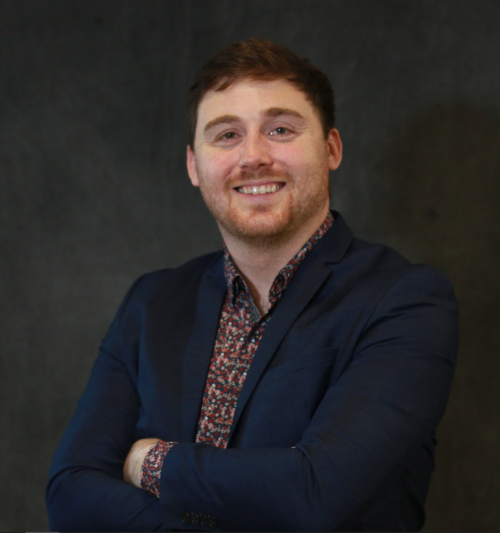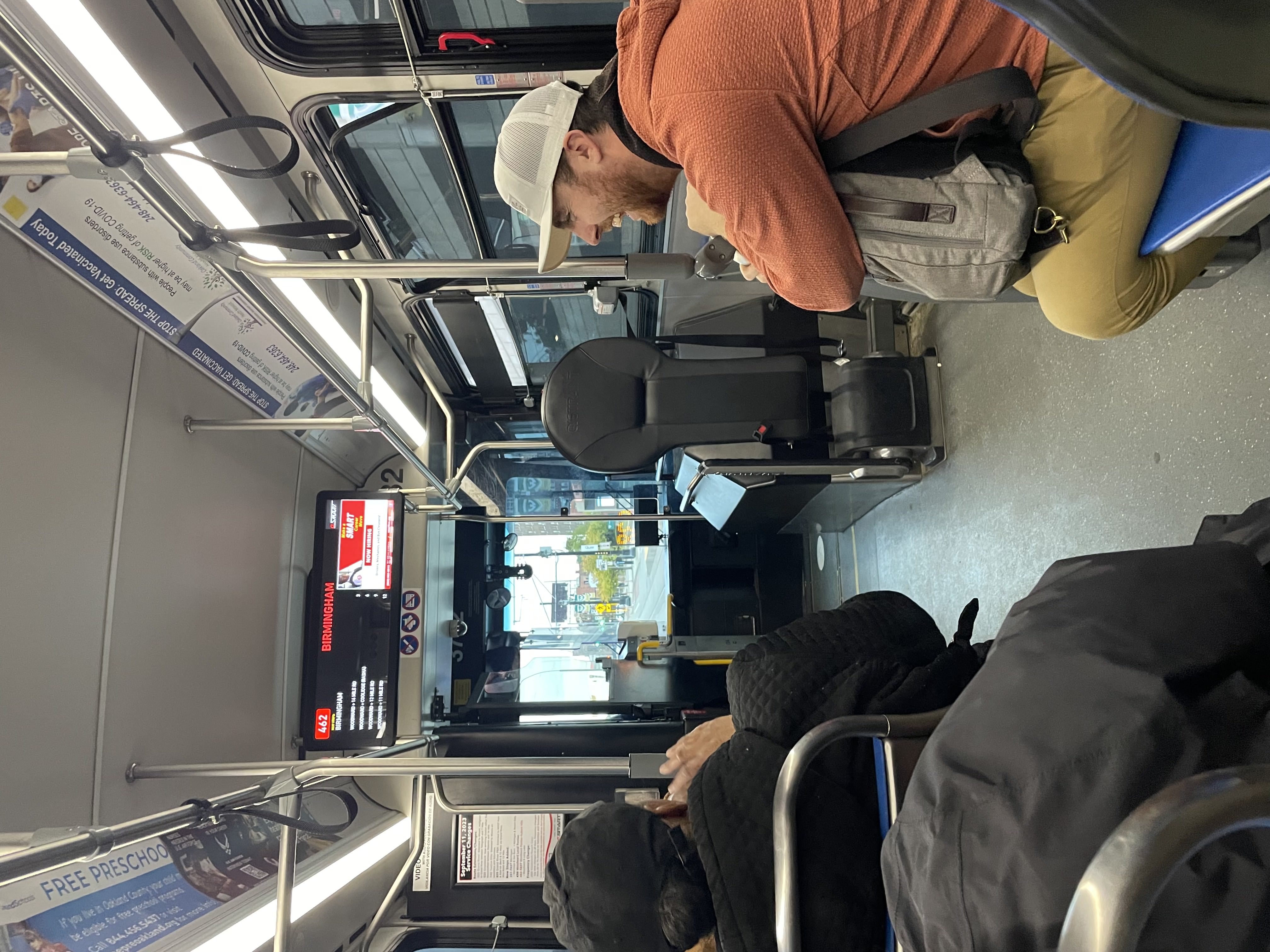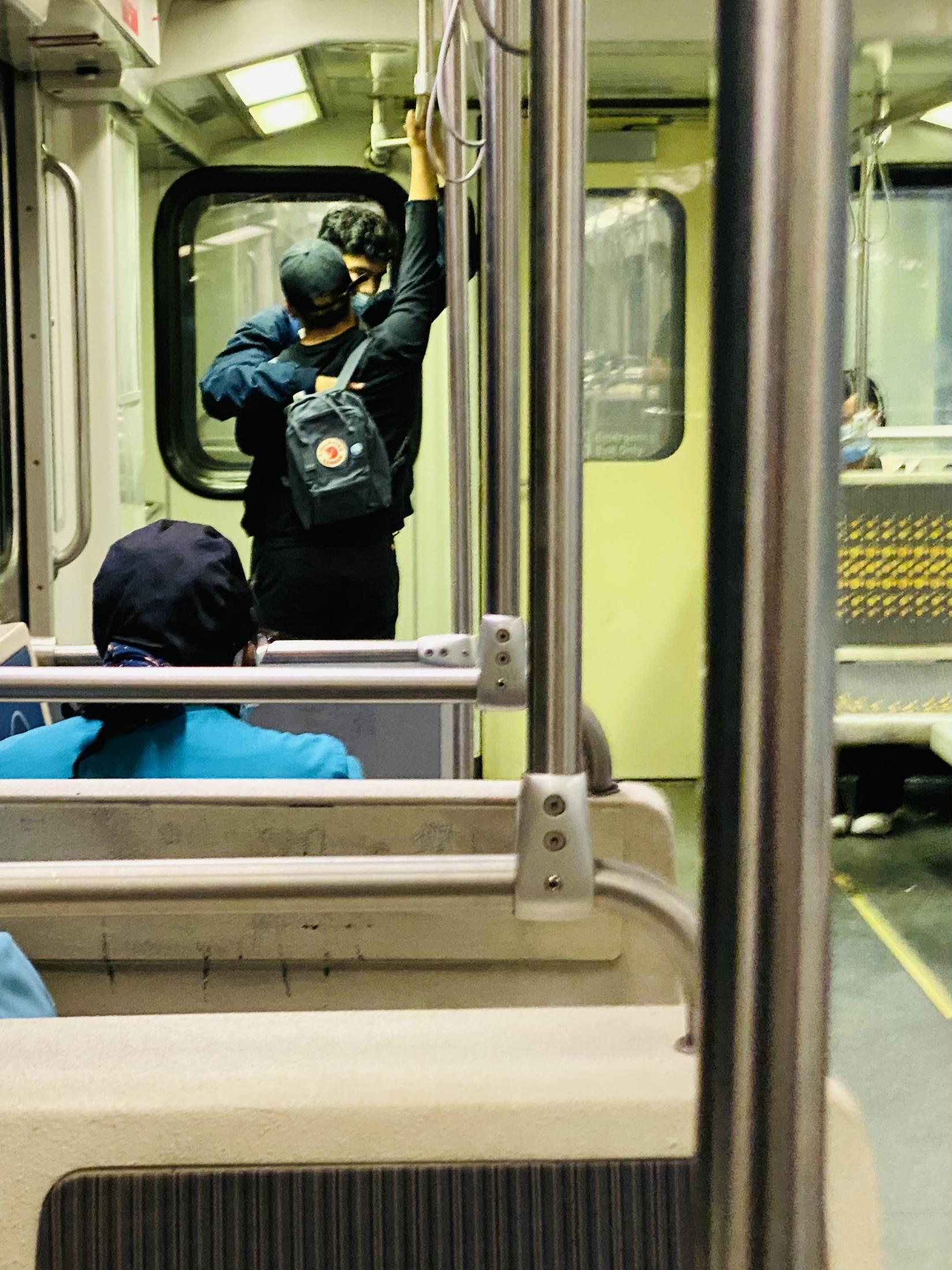USC Ph.D. candidate Robert Binder shares stories about transit as a social connector in his research
Meet NCST's 2023 Outstanding Student of the Year, Robert Binder!

A man smoking at the bus stop, chatting about his commute on a freezing Detroit night. A trio of rowdy teenagers taking a Lyft to partake in certain recreational activities. A woman’s sincere enthusiasm and pride for taking the bus to work. Such transit-based interactions are the focus of 2023 NCST Outstanding Student of the Year Robert Binder’s dissertation, “Brushing Shoulders: In-Transit Social Interactions and Intersecting Identities in Los Angeles & Detroit”. An investigation into how public transit can function as a public space and provide a mechanism for social mixing, Robert’s novel blend of quantitative and ethnographic analyses highlights the unique perspective he brings to the field of transportation planning.
Robert is a Ph.D. candidate at the University of Southern California. Originally from Detroit, he received a Bachelor’s in Civil & Environmental Engineering from Michigan State and went to Georgia Tech for his MCRP. He currently works at USC’s METRANS Transportation Center.
Robert’s research involves a combination of quantitative methods, such as categorizing transit interactions and spatial analysis, as well as qualitative techniques, like participant observation and storytelling:
“I’m riding buses and train routes, I’m sitting there doing ethnography, I’m watching what’s happening for other people, I’m writing about what I’m experiencing…but what I am really looking for is another way that we can value public transit. Between the technology and built environment that we’ve created over the last 100 years in this country, we have very separated, very segregated lives. We don’t really step outside of our bubbles. My hope is that we can start to consider transit, among other things, as a tool to bring us back together as people.”


Robert discussed the importance of considering his ‘positionality,’ recognizing that the roles he plays — as a researcher, a participant observer, a transit rider, a white, cis-gender, queer man — can impact those who interact with him. Being cognizant of these ethnographic techniques leads to a better understanding of public transit as public space. They allow Robert to, as he writes, “develop a rapport in the place of research,” and pick up on details not otherwise obvious to researchers. Similarly, qualitative research can establish a rapport with the audience:
“We are losing the general public in some sectors of research…a lot of the general public just doesn’t trust academia. If we’re going to guide policy in urban planning to make life liveable, walkable, likable, transit-able, then we have to be able to connect more with the general population and the voting population. And I don’t think we’re doing a great job of that by producing article after article and letting them just sit on the shelf. I think it’s more likely that someone is going to read an article if it can connect with them more personally instead of making them a data point. The best way to do that is through qualitative research and, more generally, storytelling.”
‘Storyteller’ is a particularly apt descriptor for Robert. Examples from his ethnographic research read like a stream of consciousness with observations not only about the other transit riders and the environment, but also about himself. Detailed and vivid, it is obvious to see how someone could appreciate this research in a way that graphs and data points could not inspire. For even a moment, through a brief sentence or paragraph, the reader can connect with their fellow human beings, whose personalities, worries, and thoughts are captured in Robert’s meticulous notes.
It is easy to see the parallels between Robert’s current research and his past work. One of his previous projects was a documentary film, “The Digital Bathhouse,” that aired on Spectrum News. He investigated the role that dating and hookup apps like Grindr play in queer people’s lives. Through the interviews he conducted for this film (which were compiled into a written ethnography), Robert also used the project as a way to examine his own experiences with the apps.
“It was also my own personal look at how I’m using these apps and using these spaces differently from others. Is there something negative about this? Can I find a positive in it? I was writing stories in this ethnography that my professor was going to read that I would never tell anyone else! There were things that were just so ‘out there.’ But to be able to put it in writing and realize that everyone has stories like this, it felt like something that was right to do.”
Other experiences have also prepared him for his current work. Following his undergraduate graduation, Robert worked creatively as a freelancer with Dr. Susan Masten, an Environmental Engineering Professor at Michigan State, to prevent tree removal along a natural beauty road in Meridian Township, Michigan. The tree removal was deemed necessary to meet sight distance roadway design requirements; however, Robert proved that safety requirements could be met while keeping the trees. Another formative event was Robert’s time abroad as a researcher for the National Institute for Environmental Studies in Japan, working on, among other things, smart mobility in Tokyo.
Robert has been recognized for a number of other awards, including a scholarship from the American Public Transportation Foundation in 2023, a scholarship from the Railway Association of Southern California in 2023, and a fellowship with the Dwight David Eisenhower Transportation program for 2021-22 and 2022-23. Looking to the long-term future, Robert hopes to pursue a tenure track position in academia, although this might change to a policymaking career out of frustration with the country’s current transportation struggles.
“If you asked me, even two years before, if I would do this Ph.D. program, I’d have laughed. I don’t think one can look at my academic history and think this is where I’d end up. I took a longer road to figure out what I’m truly passionate about. I’m proud that I haven’t let my curiosity and adventurous attitude die, that I’m going to continue being my authentic self. I’m not really sure how I got here or why I got here, but I did. And I’m happy that I did.”
Congratulations on all your accomplishments Robert!
